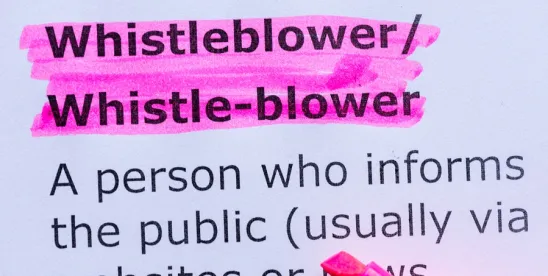The healthcare industry is massive and involves thousands of transactions that move millions of dollars daily. That makes it a great place for bad actors to defraud consumers and their private or public health insurers.
Whistleblowers play an important role in detecting these bad actors. By blowing the whistle on healthcare fraud, waste, or abuse, you can perform an important public service and even collect a substantial whistleblower award.
Here are seven things to know about the process.
-
You Do Not Need All of the Facts to Blow the Whistle
You become a whistleblower by reporting Medicare fraud or Medicaid fraud, waste, or abuse evidence. You do not need a completely fleshed-out case that could convince a jury beyond a reasonable doubt that you are correct. So long as the information you report to the appropriate authorities is what you reasonably believe to indicate fraud, waste, or abuse, and it is enough for them to act on, you can recover a whistleblower award.
-
The Process Can Be a Long One
Blowing the whistle on what you reasonably believe to be misconduct is not simple. When you finally approach the appropriate authorities, it is the culmination of an in-depth preliminary investigation on your part.
Broadly speaking, whistleblower cases follow these steps:
- You notice signs of misconduct of healthcare professionals leading to poor clinical outcomes
- After an investigation, you become more certain that what you have found is an indication of healthcare or pharmaceutical fraud, abuse, or waste of adequate nursing resources
- You decide to become a whistleblower
- You hire a whistleblower law firm or lawyer to represent you in your case
- With the guidance of your legal team, you investigate further and gather more and more evidence of the misconduct
- Once your legal team thinks that you have gathered all of the evidence that you can safely find, they will reach out to the law enforcement agency that has jurisdiction to hear your case
What happens next will be a huge step in developing your whistleblower claim.
Your legal team will present your findings to regulators or law enforcement agents and urge them to intervene in your case. If they agree, law enforcement agents from the federal government will take your case over and investigate the allegations you are making. If they decline to intervene, it will be up to you and your legal team to investigate and prosecute the case on the government’s behalf.
Government intervention drastically increases the odds of success and makes things much easier for you.
-
A Large Law Firm Has the Resources to Investigate These Claims
Because of the strong possibility that the government will decline to intervene in your healthcare fraud case and because the investigation that your legal team would then have to perform can be very intensive, it is crucial for whistleblowers to consider hiring a large law firm for their case strongly. Small, boutique whistleblower firms for healthcare cases may put all their eggs in one basket and pin their hopes on persuading law enforcement to intervene with no plans for what would happen if they decline.
-
Healthcare Fraud, Waste, and Abuse Take Many Forms
Of course, no one can blow the whistle on healthcare fraud, waste, or abuse if they do not recognize it when it happens. Just a few examples of this sort of misconduct are when healthcare providers:
- Provide unnecessary medical and patient safety care to bill the patient’s insurer
- Unbundle services that are normally billed together at a discount to inflate their costs
- Double billing
- Phantom billing, or demanding compensation from an insurance company for goods or services that were not provided
- Upcoding, or providing unnecessary procedures to the patient but billing the insurance company for a similar but more expensive one
- Paying patients to receive medical care to bill their insurer
- Taking kickbacks for referring patients to a particular provider
-
Many Different Laws Cover Healthcare Whistleblowing
One reason why it is so important for prospective healthcare whistleblowers to hire an attorney is because several different whistleblower laws could apply to their situation. Using the best one for your purposes is vitally important, but which one is the best may not be readily apparent.
Just a few of the federal laws that you can proceed under are the following:
- False Claims Act (31 U.S.C. §§ 3729 et seq.)
- Whistleblower Protection Act (41 U.S.C. § 4712)
- Military Whistleblower Protection Act (10 U.S.C. § 1034)
- Stark Law (42 U.S.C. § 1395nn)
- Anti-Kickback Statute (42 U.S.C. § 1320a–7b)
Some of these laws only apply to specific types of misconduct. One, the False Claims Act, only covers reporting fraud against a government health insurance provider, like Medicare or Medicaid. Others may be better for your purposes because they provide for higher whistleblower awards or because they provide better protections from retaliation.
-
Virtually All of Them Protect Whistleblowers from Retaliation
Because it is so foreseeable for employers to retaliate against healthcare workers who blow the whistle on misconduct happening within the company, whistleblower laws prohibit workplace retaliation and give the victims of it legal recourse if it happens anyway. In many cases, that legal recourse is a wrongful termination lawsuit. However, some of these laws, like the False Claims Act, provide for higher damages and more compensation than your typical wrongful termination claim in an attempt to deter whistleblower retaliation.
-
Whistleblowers Can Recover a Share of the Case’s Winnings
While many whistleblowers want to report the misconduct because it is a service to the public and they want to end the wrongdoing, many others are driven to act by the financial award they can recover. Nothing is wrong with this motivation: The financial incentive is designed to make whistleblowing more attractive.



 />i
/>i
